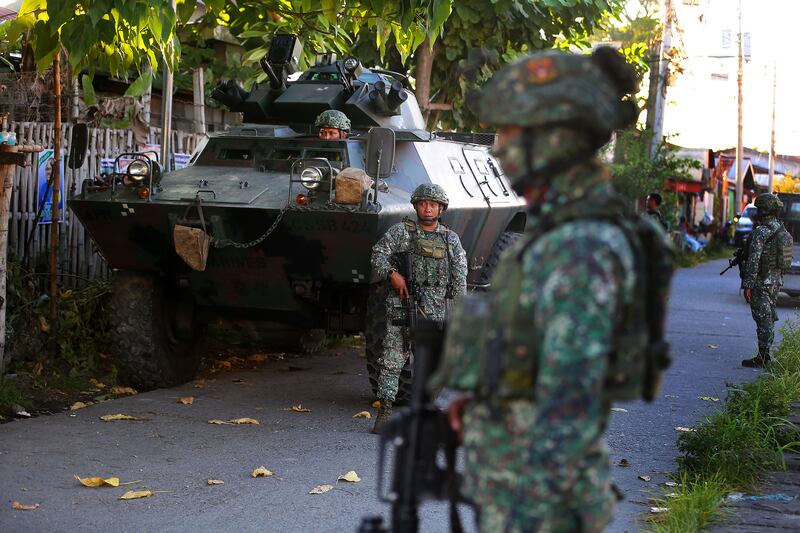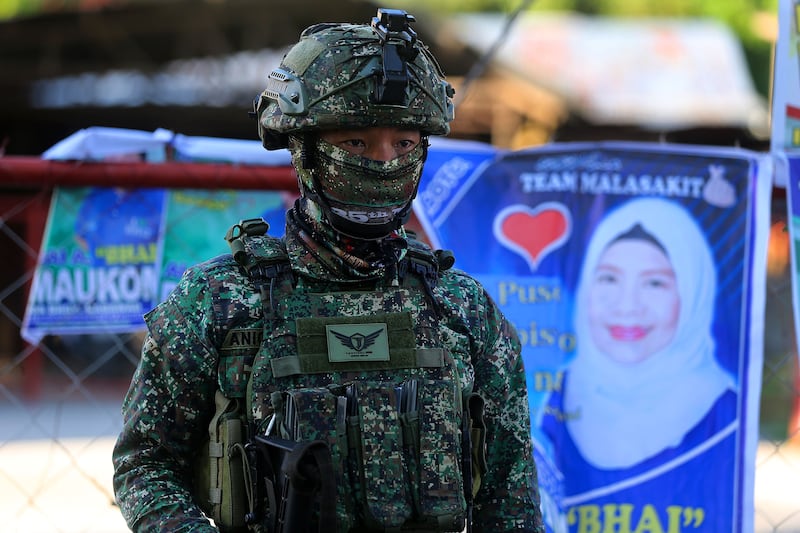Three people were killed and a dozen arrested after violence erupted between rival political camps in the southern Philippines, police said Tuesday, just days ahead of local elections in more than 42,000 villages across the country.
Gunmen suspected to be supporters of a rival politician opened fire on Nur-Moqtadin Butucan, Alfar Singh Ayunan Pasawiran and Mawie Kaunutan late Monday as they were hanging election posters for a candidate near the village of Rosary Heights 12 in Cotabato city, police said.
The three men returned fire but were killed in the shootout, while two others in their group were wounded, Cotabato city police chief Col. Querubin Manalang Jr. told reporters.
“We conducted a pursuit and clearing operations and captured 12 suspects,” he said, without naming the rival candidate.
Cotabato City Mayor Bruce Matabalao said he was deeply saddened by the violence, which comes less than a week before voters across the country cast ballots for hundreds of thousands of village officials and youth representatives.
“The loss of three lives in this incident is not only tragic but a direct affront to the peaceful democratic progress in the city,” Matabalao said Tuesday. “To those responsible, know that your actions will not go unpunished.”
The deadly shooting was one of 35 incidents of violence since the start of August that police suspect to be related to the upcoming Barangay and Sangguniang Kabataan elections.

Village elections, set on Oct. 30, are crucial because whoever wins can influence votes for national posts. Former President Rodrigo Duterte postponed the village elections last year, citing the possibility that drug traffickers could be funding the election campaign of some candidates.
Crisis24, a New York-based security risk and management agency, reported just hours before the shooting that about 18 incidents of election-related violence had been recorded since Oct. 20.
The firm advised foreigners residing in the Philippines to avoid rallies, party offices, polling stations and counting centers.
“Election-related violence between rival political parties is also possible; the government may deploy the military should significant violence occur,” it said in a statement on Monday.
Election violence is nothing new in the Philippines, where bitter rivalries between feuding clans and rival political dynasties often end up in shootings and even death.
In March, gunmen with military-training killed Roel Degamo, the governor of Negros Oriential province, and nine others. Police have named a member of the House of Representatives who is a known political rival of Degamo as a suspect, but he remains on the run.

At the weekend, 500 military personnel arrived in the southern province of Maguindanao to help maintain peace and security ahead of the polls.
“This proactive stance is aimed at safeguarding the electoral process, demonstrating the commitment of the government to upholding democracy and maintaining law and order,” said Maj. Gen. Alex Rillera, the Maguindanao military commander.
Authorities are on alert after a number of deadly attacks on politicians in the past two months.
On Aug. 28, a village chief in Albay province, Alex Repato was shot and killed by unknown assailants after filing his candidacy at the local election commission.
Eight days earlier, Haron Dimalanis, an aspiring village chairman, was shot dead in front of the town hall in Midsayap, North Cotabato province.
It is not uncommon for politicians in the Philippines to keep private armed groups on the payroll.
Most of these groups are from the Bangsamoro Autonomous Region in Muslim Mindanao, where some have known links to Islamic militants.
The Philippines’ bloodiest incidence of election-related violence occurred in November 2009 when members of the powerful Muslim Ampatuan clan were accused of killing 58 members of their rival clan, the Mangudadatu, their supporters and local journalists.
The head of the Ampatuan clan as well as dozens of others were convicted in that case. He subsequently died of natural causes in prison.

